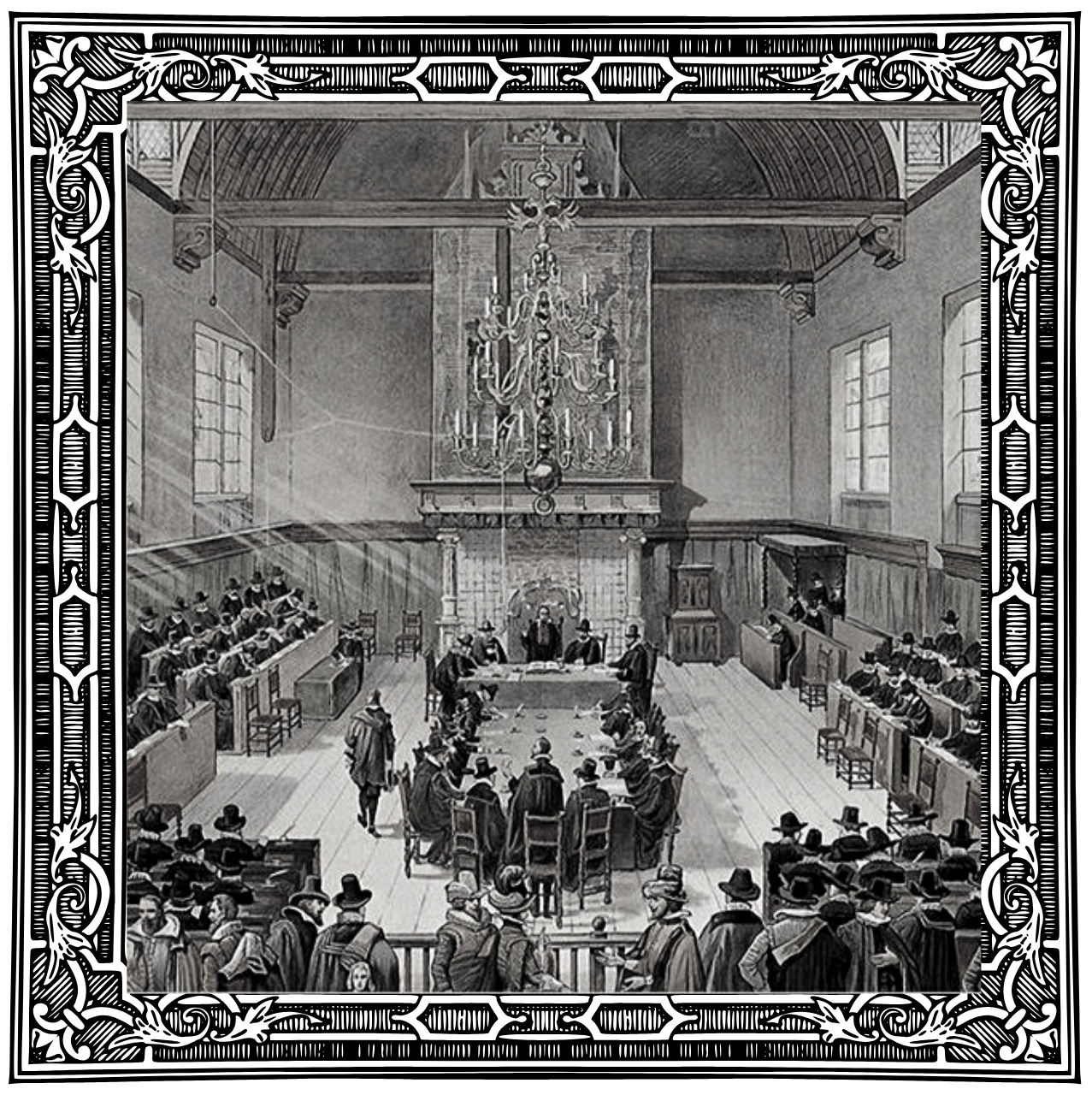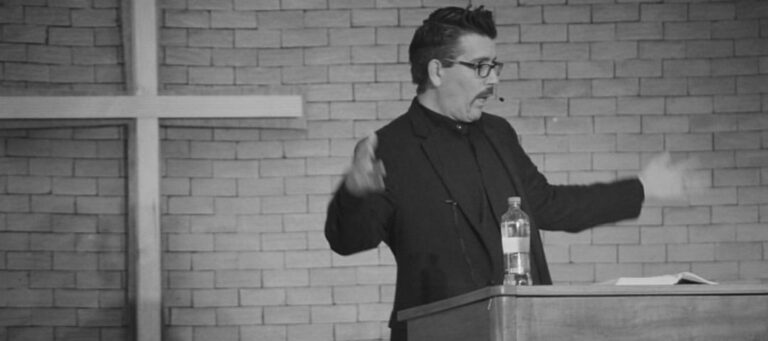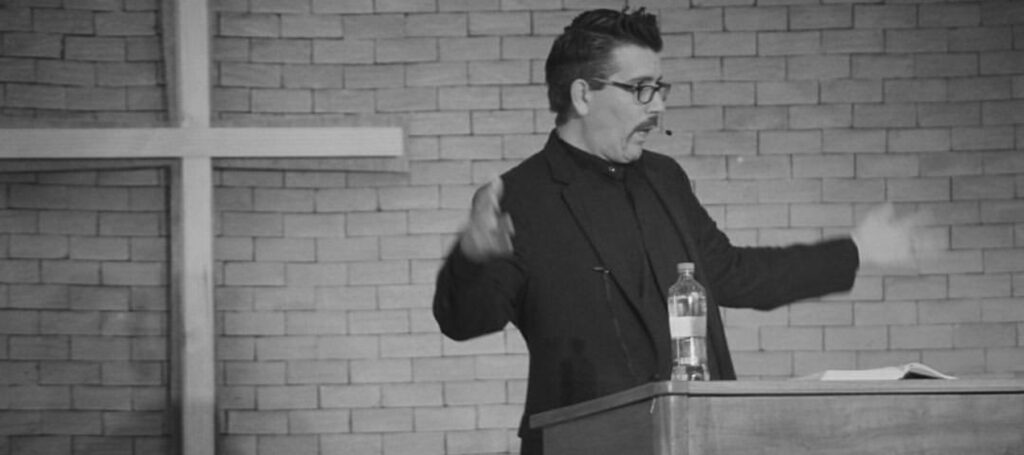In Why Sing Psalms? I cited this phrase: “The 150 Psalms shall have the principal place in the singing of the churches.” This comes from article 39 of the Church Order of the United Reformed Churches in North America to which I belong. The article goes on: “Hymns which faithfully and fully reflect the teaching of the Scripture as expressed in the Three Forms of Unity may be sung, provided they are approved by the Consistory.” Why sing hymns? (songs other than the Psalms).
A Key Distinction
To do this, it’s important to make a key distinction. Exclusive psalmody is singing only the Psalms; inclusive psalmody includes the Psalms along with others. Within inclusive psalmody is a further distinction: the inclusion of other Scripture texts and the inclusion of other texts based on Scripture. I will be arguing for this latter, most inclusive position. All three view affirm that “the 150 Psalms shall have the principal place in the singing of the churches.” In fact, the Church Order does not proscribe exclusive psalmody; neither does it prescribe this position. It’s up to each individual consistory (body of ministers and elders).
Argument for Exclusive Psalmody
Why sing hymns? In arguing for hymns I’m by definition arguing against exclusive psalmody. Let me start here. To do this I’ll use Brian Schwertley’s “The Biblical Case for Exclusive Psalmody” as a representative of this position.[1] I’ll state his arguments then respond.
Strict Application of the Regulative Principle
Assertion: Schwertley states his biblical case this way: “The fact that God has placed within the canon of inspired Scripture a collection of 150 worship songs itself proves that God requires these songs to be used in public worship.”[2]
Response: In doing this he elicits an argument from fear: singing out of a hymnal is “a sign of humanism”[3]. Why? Many hymnals have songs by Unitarians, Socinians, Arminians, and feminists. This is also a genetic fallacy. The origin of a song doesn’t disprove its value any more than Paul’s citation of the ancient proverb “Cretans are always liars, evil beasts, lazy gluttons” (Titus 1:13).[4] This is the logical fallacy of petitio principii, begging the question. Schwertley states his conclusion as an unproven premise. It’s the same as me saying, “The fact that God has placed within the canon of inspired Scripture a collection of 150 prayers itself proves that God requires these prayers to be used in public worship.” Schwertley also begs this question: are all 150 Psalms songs in the first place? Some are prayers, some are songs; many are corporate, but some individual; some antiphonally sung, others were private meditations.[5] Abraham Kuyper said the analogy between prayer and singing would mean for the exclusive psalmody position that only the texts of the Psalms could be prayed.[6] Yet “we can find no place in Scripture where the apostles imposed upon the congregations the use of Old Testament prayers or songs as they were written originally, as the only conceivable or permissible form.”[7]
Assertion: Schwertley states the ancient people sang the Psalms because inspired prophet composed everything they sang.
Response: Does this mean to “preach the Word” means we must only proclaim the inspired Word of God and not add our exposition and application? Or, must one need to be an apostle or prophet to preach or pray in public?[8]
Assertion: Schwertley states the reason we sing only the Psalms is because the Hebrew term mizmor means to sing Psalms.
Response: The commands to sing “psalms” are general commands to praise. Nothing in these commands limits singing to the Book of Psalms.[9] Schwertley says his point is proven by the fact that every song sung in the Bible is an inspired song. This overstates the case. Inclusion in the Canon doesn’t mean inspiration when first sung, only that inspired is guaranteed by inscripturation into the pages of Holy Writ.
Assertion: Schwertley further seeks to prove his case, stating, “God has placed a psalm book right in the middle of our Bibles.”[10]
Response: Benjamin Shaw states, tongue-in-cheek, that this is like the Ontological Argument for God’s existence from Anselm: “either the reader sees it or he does not.”[11] This is a simplistic argument to make when you pull up your table of contents in an English Bible. Psalms is the 19th of 39 Old Testament books. Yet in our Hebrew Bible it’s 27th.
Assertion: Schwertley states that Jesus sang Psalms.
Response: Of course he did. He was a first century Jew. What’s interesting is that Schwertley says, “Should one take the meaning of ‘sing praise’ from ancient Greek paganism, from modern American evangelical church practice, or from the Bible?” To prove that Jesus’ singing in Matthew and Mark was the Psalms, he resorts to the logical fallacy of appeal to authority: “virtually all commentators” and an appeal to tradition: “if the tradition, preserved among the Jews, is of any weight in such a matter.”[12]
Assertion: Schwertley takes us Ephesians 5:19 and Colossians 3:16. Psalms, hymns, and spiritual songs “clearly refers to the Old Testament book of Psalms.”[13]
Response: Again, I find Benjamin Shaw helpful in response. The Psalms contain a variety of terms used in the titles but these three never occur in the same title.[14] Further, psalmos, humnos, and hode, were used by the Septuagint translators for a variety of Hebrew words, not just those in the Psalter. The conclusion is that these are not technical terms for the Psalms.[15] Further, when the New Testament refers to the Book of Psalms it always says “the Book of Psalms” (Luke 20:42; Acts 1:20), “the Psalms” (Luke 24:44), or by specific Psalm (Acts 13:33, 35).[16] Shaw says, “it seems extremely unlikely, if Paul had intended to direct the Ephesian and Colossian churches to the Book of Psalms as the manual for praise that he would have used an obscure and uncertain phrase used nowhere else in Scripture instead of a clear and explicit statement.”[17]
Sufficiency of the Psalter
Assertion: Schwertley says, “The idea that God’s inspired hymn book is inadequate, defective, and out of date, and therefore ought to be superseded or improved upon by the uninspired compositions of sinful men, must be emphatically rejected.”[18]
Response: I find this to be utterly a red-herring and straw man argument.
Assertion: Schwertley says the Psalms reveal a “clear portrait of Christ and His work.”[19]
Response: This is a constant refrain from exclusive Psalmists. While we belong to the same covenant of grace, the Old Testament is a land of types and shadows. They only reveal the concealed Christ because of the light of further revelation.
Assertion: Schwertley says the Psalms are a “treasure house of biblical doctrine.”[20]
Response: To state it again, then why is there need of further revelation?
Assertion: Schwertley says “singing of psalms with grace in the heart” (Westminster Confession of Faith 21.5) means only psalms.
Response: First, I’m not sure seventeenth century divines distinguished “psalm” v “hymn.” Second, the Confession states positively the singing of psalms; it doesn’t negate other songs. Why is this important? The Westminster Assembly and contemporaries included advocates of non-Psalms in singing. Thomas Manton commented on James 5:13, “Is anyone cheerful? Let him sing praise [psalms]”:
“I confess we do not forbid other songs [non-Psalms]; if grace and pious, after good advice they may be received into the Church . . . [he then cites a well-known passage from Tertullian on singing privately composed songs] . . . But that which I am to prove, that scriptural psalms may be sung [he’s arguing here against those who said the Psalms were too Old Covenant and legal for us to sing], and I shall, ek perissou, with advantage over and above, prove that they are fittest to be sung.”[21]
Manton basically argued what John Calvin said in his Preface to the Genevan Psalter. Calvin in turn summarized Augustine: the Psalms are the best thing to sing. They both said this without condemning other songs. Another example is Edward Leigh, who in 1654 said,
As we may lawfully sing Scripture psalms, so also Songs and Psalms of our own [Note: Singing of Hymns is by some counted an Ordinance, that is, any person of the Congregation exercising their own gifts, should bring an Hymne and sing it in the Congregation, all the rest being silent and giving audience. M. Edw. ] inditing (say some) agreeable to Scripture, Sing unto the Lord a new Song, framed on a fresh occasion, therefore 1 Cor. 14. 26. a Psalm is named among those things which they had for the use of the Church. For seeing a Psalm is but a musical praier for the most part, therefore we may make Songs for our selves agreeable to the Word of God as well as prayers, and God knowing the efficacie of Poetry and Musick, to help memory and stirre up affection doth allow his people to use it for their spiritual comfort as well as natural. The Apostle speaketh of Psalms, Hymns and spiritual Songs, Ephes. 5.19. & Col. 3.16. Who can shew any reason to limit his speech to Scripture-psalms? Why may not one praise God in a Song for our deliverance in 88, or the Gun pouder treason?[22]
Let me go back ever further to the Constance Hymnbook of 1540. Ulrich Zwingli in Zurich taught there there shouldn’t be singing in public worship. Martin Bucer in Strasburg taught that songs should only be Scripture. Martin Luther had well-known appreciative views of music and singing. In this context the Reformed Church in Constance sought to bring peace to disparate practices. The Hymnbook followed Ephesians 5:19/Colossians 3:16: “psalms, hymns, spiritual songs.” There were 67 settings of 55 Psalms. 60 hymn choices came before or after the sermon. 23 songs replaced the worldly songs people were singing every day.
Many affirm this truth—that one may sing and it is not against God [contra Zwingli]—but they have other objections, such as that one should sing nothing but Psalms or whatever else is spelled out in the Bible [Bucer]. They do not have a wicked view but are lacking proper judgment and discernment. To insist on Scripture, word for word, because of the many who have misused it and desire to misuse it is to do well and right, but one should not at the same time discard the gifts of the Holy Spirit which the Spirit works in so many ways. One must always insist much more on the meaning and understanding of the Scriptures than on the words. All men are prisoners of their own understanding, both the erudite and the ignorant, but the letter and the word are free. Therefore, that which is approved by reason is also Scripture however different the words may be. What is not approved by reason is contrary to Scripture however exact the words may be and even if they are already vainly gilt. That is why, in their banquets that they held with the poor, many of the old Christians allowed not only the singing of Scripture but also of songs which they brought themselves; though, to be sure, they allowed nothing that would be against God or the understanding of the Holy Scriptures. Others stumble on the fact that the Psalms and other songs are rhymed. They are also concerned solely with the words. They do not consider that if one can bring a thing to a good and thorough understanding, then it is good, although in any case nothing can be accepted apart from a proper understanding of Scripture. The words belong to the believer and not the believer to the words, as Christ also said of the Sabbath. St. Paul wrote, “It is all ours, but we are Christ’s.” Only let everything be according to faith and love, the understanding of which is the entirety of the Holy Scriptures. And still some are vexed that the Psalms are sung back and forth in the alleyways and houses without seriousness and propriety. Their displeasure at this misuse is not mistaken, for, if lewdness and crassness are ill fit in temporal things, how much worse they are in godly things. There is no shortage of crass people who use not only godly singing in a lewd manner but who have much more wanton songs and singing in regular use. As full as papism is of falsely spiritual, idolatrous, self-serving, and unregenerate singing, so full is the world of unspiritual, frivolous, impure, and harmful songs in which God and one’s neighbor are profaned. Therefore, let there be good and godly singing of the Psalms and other songs with which little fault can be found, so that through them the use of the others would diminish. That is why St. Paul admonishes the Ephesians that they should put away their shameful words, foolish works, and frivolous quarrels. Likewise, they should happily put away their shameful worldly songs which are not rhymed for God’s praise and the honor of the holy faith.[23]
Conclusion
In conclusion, I don’t find the arguments presented by Schwertley convincing in any way. Overall, I find his writing style to lack sophistication as well as being biblicistic.
Argument for New Hymns
Why sing hymns? We now turn our attention to the positive case for them. Scripture positively commands us to sing. It never positively commands us to sing only Psalms (or canonical texts). Scripture never negatively forbids us from singing non-canonical songs. Thus “hymns” are included in the Church Order I use. Someone needs to oversee their inclusion, which is a matter for the leaders of local congregations.
I believe Scripture gives us three big biblical-theological themes to follow:
First, the people of God in the New Covenant have left the tutelage of the law and its shadows behind (e.g., Gal. 3:23–4:7; Hebrews). Why sing hymns? In terms of this discussion, because we’re free to step into the light of Jesus Christ and worship God in the Spirit. Under the Old Covenant, worship was restricted to the Temple now wherever God’s people are there is his dwelling place. Priests once offered worship on behalf of the people, now all are a kingdom of priests. Then there were prescribed sacrifices, now Jesus is the final sacrifice and we offer our lives. While the Old Testament contains the Book of Psalms, in the New Covenant we’re commanded to offer the “sacrifice of praise…the fruit of lips that acknowledge his name” (Heb. 13:15). Our praise is now more free and full of light.
Second, the people of God in the New Covenant have the revelation and completion of the promised redemption in the person and work of Jesus (e.g., Heb. 1:1–2). Why sing hymns? As Robert Letham said, “the Psalms do not explicitly reflect the full range of trinitarian revelation: neither the incarnation, life, ministry, death and resurrection, ascension, and heavenly session of Christ, nor the gift of the Spirit to the church.” Yes there are verses here and there that shadow all these but not in their fulness. As Letham continues: “It is strange that a principle requiring explicit biblical support for worship practices should require those practices to refer to the central truths of biblical revelation only implicitly.” The Old Testament is insufficient for the full faith, life, and worship of God’s people. To conclude, Letham said: “For this reason, if no other, the Psalms cannot be the sole diet of the church. If they were, that would truncate its worship and producing an imbalance in its theology.”[24]
Third, the people of God in the New Covenant have received from the ascended Lord the Holy Spirit to lead it into all truth (e.g., John 14:15–18, 25–26; 16:13–15). Why sing hymns? The New Covenant Church of Jesus is Spirit-ually competent to express praise consistent with the revelation found in the Word. To go back to the language of the Church Order my congregation uses: “Hymns which faithfully and fully reflect the teaching of the Scripture as expressed in the Three Forms of Unity.” This principle is consistent with Paul’s link in Ephesians 5:19/Colossians 3:16 between singing and teaching truth.
Why sing hymns? They express the freedom and light of the New Covenant’s full revelation of Jesus into which the Holy Spirit promises to guide his people.
[1] Brian Schwertely, “The Biblical Case for Exclusive Psalmody,” in The Worship of God: Reformed Concepts of Biblical Worship (Ross-shite, Scotland: Mentor, 2005), 181–204.
[2] Brian Schwertely, “The Biblical Case for Exclusive Psalmody,” in The Worship of God, 183.
[3] Schwertely, “The Biblical Case for Exclusive Psalmody,” 184.
[4] Schwertely, “The Biblical Case for Exclusive Psalmody,” 184 n7; see 187 n9.
[5] See Benjamin Shaw, “A Defense of Biblical Hymnody,” in The Worship of God, 209.
[6] Kuyper, Our Worship, 37–38.
[7] Kuyper, Our Worship, 38.
[8] On this point see the response of Shaw, “A Defense of Biblical Hymnody,” 210–211.
[9] Shaw, “A Defense of Biblical Hymnody,” 206, 209.
[10] Schwertely, “The Biblical Case for Exclusive Psalmody,” 190.
[11] Shaw, “A Defense of Biblical Hymnody,” 209.
[12] Schwertely, “The Biblical Case for Exclusive Psalmody,” 193.
[13] Schwertely, “The Biblical Case for Exclusive Psalmody,” 195–196.
[14] Shaw, “A Defense of Biblical Hymnody,” 207.
[15] Shaw, “A Defense of Biblical Hymnody,” 214–215.
[16] Shaw, “A Defense of Biblical Hymnody,” 215.
[17] Shaw, “A Defense of Biblical Hymnody,” 215.
[18] Schwertely, “The Biblical Case for Exclusive Psalmody,” 182.
[19] Schwertely, “The Biblical Case for Exclusive Psalmody,” 201.
[20] Schwertely, “The Biblical Case for Exclusive Psalmody,” 202.
[21] Manton, Works, 4:441–445. For a more thorough history of hymn singing, see J.J. Van Oosterzee, Practical Theology: A Manual for Theological Students, trans. Maurice J. Evans (London: Hodder and Stoughton, 1878), 386–99.
[22] A Systeme or Body of Divinity (1654), 610.
[23] “In Translatiōne: The Preface to the Constance Hymnbook by Joannem Zwick,” trans. Ephraim Schäfli. The Confessional Presbyterian 7 (2011): 228–29.
[24] Robert Letham, “Does the Regulative Principle Demand Exclusive Psalmody?” 9Marks Journal (July–August 2013). As found at https://www.9marks.org/article/journaldoes-regulative-principle-demand-exclusive-psalmody (Accessed October 22, 2019).







